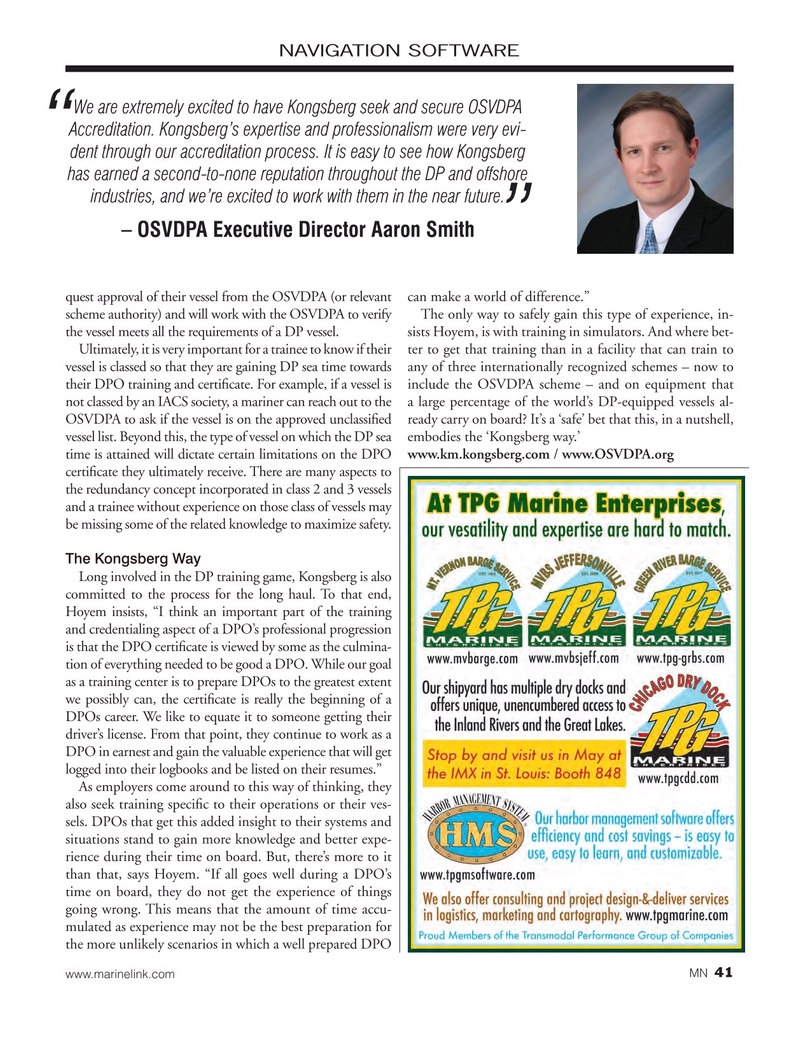
Page 41: of Marine News Magazine (April 2017)
Boatbuilding: Construction & Repair
Read this page in Pdf, Flash or Html5 edition of April 2017 Marine News Magazine
NAVIGATION SOFTWARE
We are extremely excited to have Kongsberg seek and secure OSVDPA
Accreditation. Kongsberg’s expertise and professionalism were very evi- “ dent through our accreditation process. It is easy to see how Kongsberg has earned a second-to-none reputation throughout the DP and offshore industries, and we’re excited to work with them in the near future.
– OSVDPA Executive Director Aaron Smith ” quest approval of their vessel from the OSVDPA (or relevant can make a world of difference.” scheme authority) and will work with the OSVDPA to verify The only way to safely gain this type of experience, in- the vessel meets all the requirements of a DP vessel. sists Hoyem, is with training in simulators. And where bet-
Ultimately, it is very important for a trainee to know if their ter to get that training than in a facility that can train to vessel is classed so that they are gaining DP sea time towards any of three internationally recognized schemes – now to their DPO training and certi? cate. For example, if a vessel is include the OSVDPA scheme – and on equipment that not classed by an IACS society, a mariner can reach out to the a large percentage of the world’s DP-equipped vessels al-
OSVDPA to ask if the vessel is on the approved unclassi? ed ready carry on board? It’s a ‘safe’ bet that this, in a nutshell, vessel list. Beyond this, the type of vessel on which the DP sea embodies the ‘Kongsberg way.’ time is attained will dictate certain limitations on the DPO www.km.kongsberg.com / www.OSVDPA.org certi? cate they ultimately receive. There are many aspects to the redundancy concept incorporated in class 2 and 3 vessels and a trainee without experience on those class of vessels may be missing some of the related knowledge to maximize safety.
The Kongsberg Way
Long involved in the DP training game, Kongsberg is also committed to the process for the long haul. To that end,
Hoyem insists, “I think an important part of the training and credentialing aspect of a DPO’s professional progression is that the DPO certi? cate is viewed by some as the culmina- tion of everything needed to be good a DPO. While our goal as a training center is to prepare DPOs to the greatest extent we possibly can, the certi? cate is really the beginning of a
DPOs career. We like to equate it to someone getting their driver’s license. From that point, they continue to work as a
DPO in earnest and gain the valuable experience that will get logged into their logbooks and be listed on their resumes.”
As employers come around to this way of thinking, they also seek training speci? c to their operations or their ves- sels. DPOs that get this added insight to their systems and situations stand to gain more knowledge and better expe- rience during their time on board. But, there’s more to it than that, says Hoyem. “If all goes well during a DPO’s time on board, they do not get the experience of things going wrong. This means that the amount of time accu- mulated as experience may not be the best preparation for the more unlikely scenarios in which a well prepared DPO 41 www.marinelink.com MN

 40
40

 42
42
